First thoughts from a Rivian R1S test drive
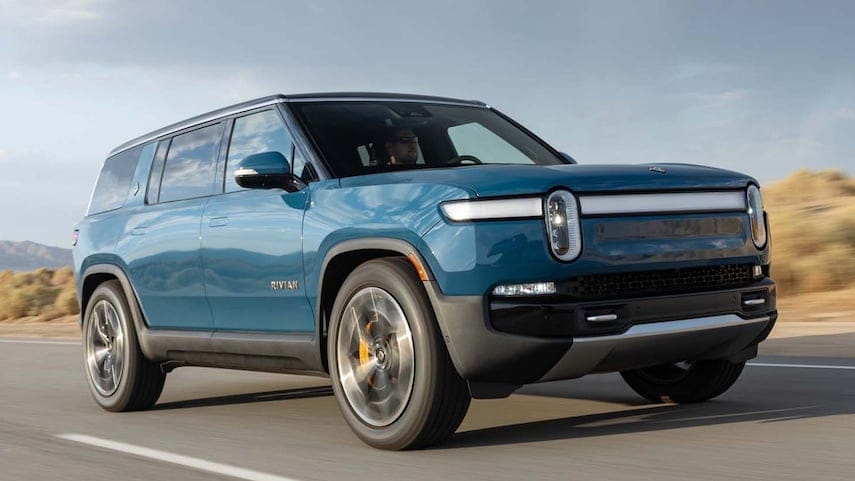
In February of 2020, I plunked down a deposit on the Rivian R1S, a 3-row full electric SUV soon after the Rivian truck was announced and truck prototypes were shown at various events. I've owned nearly a dozen different trucks over my life but as I've gotten older I've come to appreciate off-road capable SUVs as more useful. It's a full EV with around 300 miles of range, can seat 7 people in a pinch, and has more than seven feet of flat floor inside with the seats down (longer than a queen bed!). It seemed like the ultimate go anywhere, do anything, but also do-it-in-extreme-comfort kind of car.
I ordered it right before COVID first hit, and my Rivian profile page said I was six months away from getting the R1S built for about two years, regularly updating to six months further into the future as dates approached and their production got further behind. Last Fall, they committed to early reservation holders like me and I got a build date of February or March of 2023, which still sounded impossibly far off into the future.
Last week, a greetings email hit me from Rivian saying my build date was just around the corner and we’d soon figure out logistics, and if I wanted to test drive one, I could try out a R1S in Portland. I immediately replied and today I spent an hour in a Rivian for the first time.
The good
Right off the top, it's a very nice luxury SUV that feels like it warrants its high ($80k-90k) price. It's feels big inside, but not super big on the outside, more like a mid-sized SUV. The horsepower and torque is ridiculous, with 845hp and 906ft/lbs of torque and when I hammered the throttle to the floor it really sent you back into your seats in the way only big EVs do.
I was impressed that in normal driving, it felt very mild-mannered, and drove completely like a normal SUV. If you wanted to haul ass you had to slam the gas pedal to the floor, whereas in a friend's Tesla Model 3 I felt like I was accidentally making the car go way too fast constantly.

The interior is great, with tons of good ideas. Touch your finger to any light in the ceiling or above the doors and they turn on via capacitive touch. There's an always-charged flashlight in the driver's door you pop out by tapping it. The bluetooth speaker in the center console is also always charged and could be nice for beach trips.
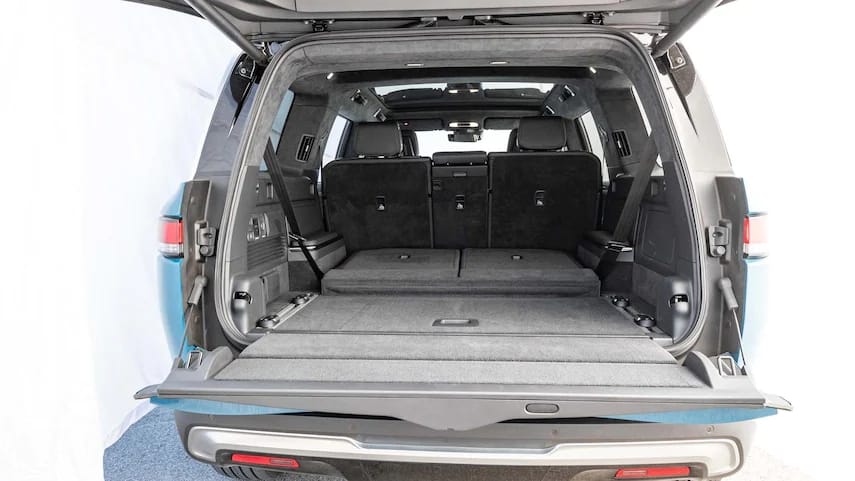
I was impressed with the interior space when you fold down the second and third row seats. You get a fully flat floor, about 86" long and about 56" wide, which is a tad narrower but half a foot longer than a queen-sized bed. Even at my 6'3" height, I can sleep comfortably in the back as-is and would totally use this for camping with an air mattress (that can inflate thanks to the built-in air compressor in the back!)
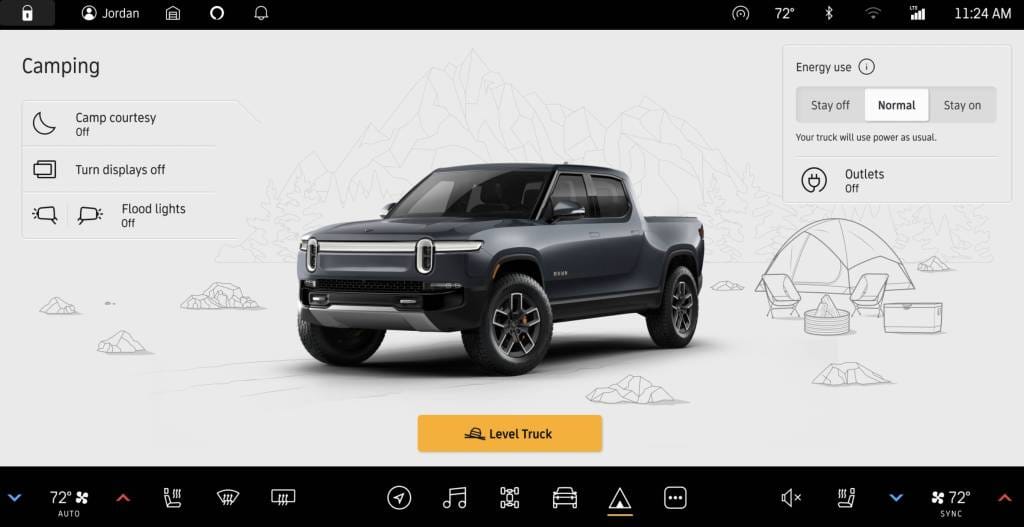
Rivian is doing monthly over-the-air updates and recently they added a "Camping Mode" which is really slick. You can turn off all the electronics but keep the heat or A/C going as you sleep inside overnight. You can turn off the lights and screens and presence monitors to save battery life. I don't know how much total battery gets used by 8hrs of light heater or air conditioning running, but if I ever camped in a RV spot at a campground, I'm sure you could keep it plugged in and comfortable your entire trip. The best feature of camping mode was that it used its own air suspension to fully level the car front/rear and side to side, so it doesn't really matter where or how you park, each of the corners has about 8" of suspension travel to tweak until the whole thing is perfectly flat.
For the most part, it was very quiet inside, the suspension felt smooth enough on rough roads, and all the nice touches were delightful (there are something like a dozen USB-C ports all over it front to back).
The not so good
With any new car company, it's a bit risky to buy their first edition cars because they've only been in production for a year or two. This is why the doors of a Tesla might not fit together well, but if you buy a Ford Mustang or F-150 EV, the bumpers and doors always line up perfectly because the company behind them has already produced cars for over 100 years. It feels a little risky to plunk down so much money on essentially an untested new release from a new manufacturer.
It's also weird how about 75% of the car feels like the highest luxury, but about 25% doesn't at all. You get heated and cooled seats up front, heated seats in the second row that slide forward/back and recline. But the third row seats are manually raised and lowered (most minivans over $40k have power 2nd/3rd row seating), and there's no heads up display option above the dash to help you keep your eyes on the road, even though most cars over $60k have some sort of HUD option. During the test drive I was sitting in the backseat for a bit and it was getting warm, and I checked the little center console video display and saw my climate controls were set to 73ºF. I couldn't find an arrow button to cool things down and the rep mentioned it was keyed off his settings up front, and I couldn't change the temp, only turn my vents off or on.
There is no CarPlay or Android Auto in the Rivian because Amazon was an investor so the only voice assistant inside is Alexa, not Siri or Google. This is almost a dealbreaker for me since I use CarPlay heavily to keep my eyes on the road while having texts read to me or picking music by voice. The Rivian rep on my test drive said they currently don't support letting you know you got a text or hearing it read out loud, but hope to include it in future OTA updates.
Last thing that stuck out was the regenerative braking. When you lift your foot off the gas pedal in most EVs, you can optionally have the car use the engine to recapture power into the batteries, but also slow down without touching the brakes. This is called "one-pedal driving" in EVs, but what was shocking to me was even in the mildest mode, the Rivian R1S regen braking was really strong, to the point that passengers can start to feel car sick as the car bucks any time the driver lifts their right foot. I'm sure this will take practice and after a week I'd figure out how to leave very slight pressure on the pedal to "coast" a bit more, reserving full regen braking for stop signs and lights. I've driven about half a dozen different EVs over the last few years and the Rivian easily had the strongest regen braking (and it couldn't be turned off completely or turned down, only made even more aggressive).
The verdict
I'm going ahead with my long standing pre-order but while I'm happy with my built-up Jeep Rubicon plugin hybrid off roader, this will be my partner's daily driver car. We'll take it on camping trips in the state, but rarely go on road trips longer than 300 miles since high output non-tesla charging stations are few and far between, especially in the deepest reaches of Oregon (though Rivian is trying to build their own high-speed charger network).
Even though Rivian was established about 10 years ago and raised billions to get going, it still feels a bit risky to buy such an expensive car from a company new to the game. But they've been great on customer support since they started taking pre-orders so I have some confidence they'll support the launch edition versions of their vehicles, hopefully for the next 5-10 years and beyond into the future.
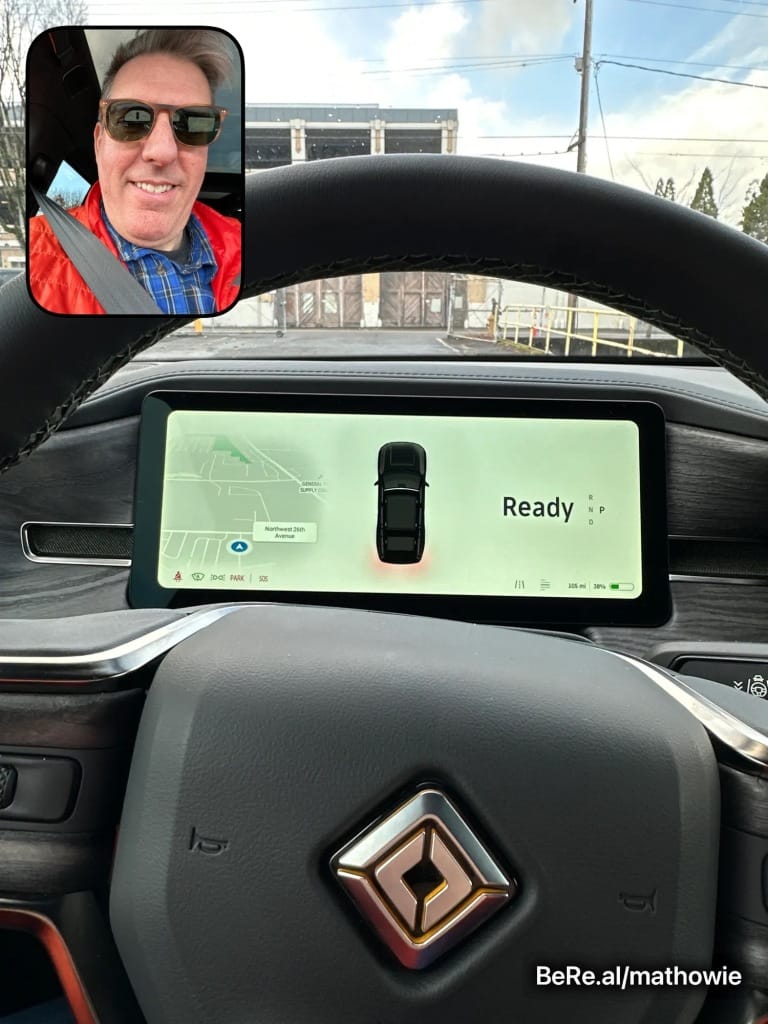
Another good sign from today's test drive: I didn't take any photos beyond a quick BeReal prompt just as I got in, because I was having too much fun driving around and testing everything out the whole time.
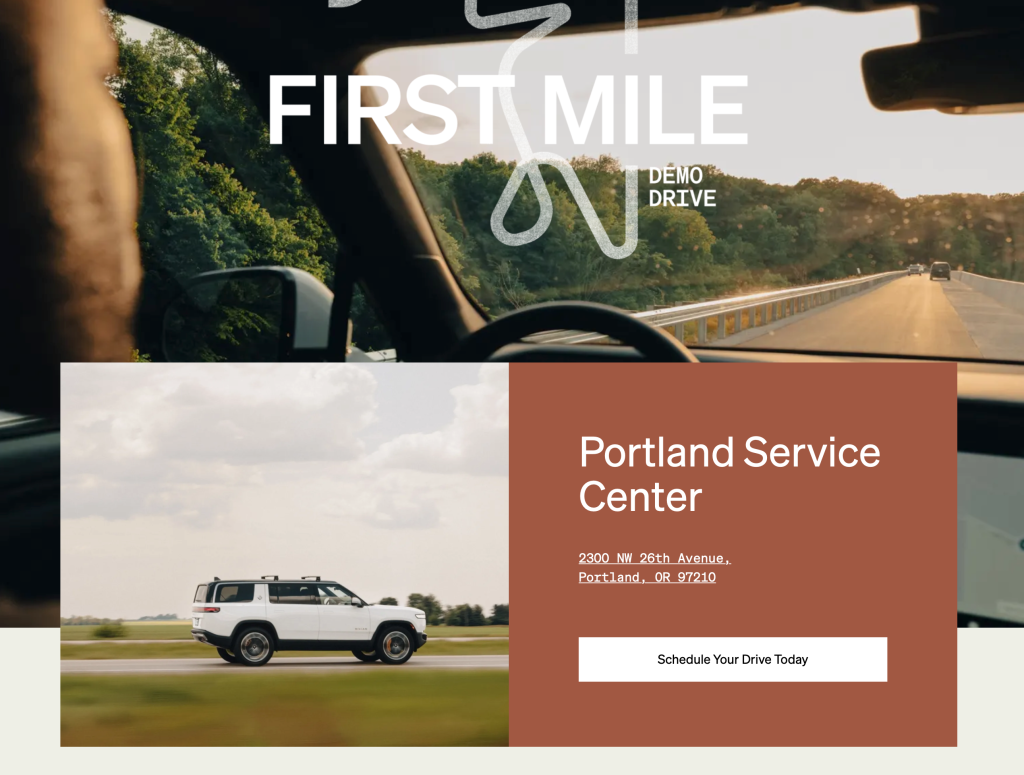
If you want to check out these cars, signing up for their newsletter will tip you off to test drive centers and test events in your area. For me it popped up as an option pictured here on my pre-order configuration page as of last week.
Subscribe to our newsletter.
Be the first to know - subscribe today





